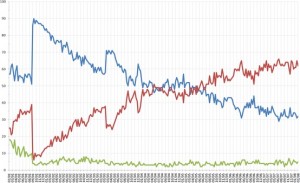As a researcher, one of the favorite questions I get asked relates to a comment typically attributed to Henry Ford about faster horses. The story, as it is supposed to go, says that Henry Ford once proclaimed “If I would have asked my customers what they wanted they would have told me Faster Horses.” This saying is supposed to offer justification for not doing research. After all, if a great mind such as Henry Ford didn’t believe in asking his customers what they wanted, why should anyone else?
Ford once proclaimed “If I would have asked my customers what they wanted they would have told me Faster Horses.” This saying is supposed to offer justification for not doing research. After all, if a great mind such as Henry Ford didn’t believe in asking his customers what they wanted, why should anyone else?
I have to say, as the former Lead Quality Analyst for the Ford Explorer Vehicle line and as a bit of a Ford history buff I absolutely love this story. As the founder and president of a market research and data analytics company I love it even more.
So let’s start with the facts and look at the first misstatement. Henry Ford didn’t actually make this statement. There was an interesting article on the Harvard Business Review blog that explores the statement and confirms that it was not made by Ford. So step one, even though most people give Ford credit for this statement we should probably acknowledge that it was really made by someone else.
Regardless of who said it though, there are some important points about this statement that should be considered by anyone trying to understand their marketplace or the world in general.
Furthermore, there is likely some truth to the literal interpretation of the saying. In the early days of the automotive industry vehicles (horseless carriages) were competing with horses and horse-drawn carriages for share of wallet and also share of the road. Had someone asked the typical non-vehicle driving, horse owner what (s)he wanted, a likely response may have been “faster horses”. So that part we can assume is probably true.
The real question becomes what is meant by “faster horses” ?
Taking the answer literally provides very little information and brings about a unique set of problems. For instance we would need to consider:
- What are the safety concerns of faster horses?
- Will the carriages have to be changed to handle the increased speed?
- Will wider roads be needed?
Good research would also go on to explore the challenges with the current process. This could include questions like:
- Why are horses currently going slow?
- Have you tried to go faster before? What happened?
- What things worked when you did try to go faster?
- What are you feeding the horses?
While interesting, none of those questions or answers really provides a deeper insight into the problem than what was available before asking the question.
As researchers and as consumers of research, we need to go farther. To really understand the needs of the marketplace we need to focus on the meaning behind the words. We hear the words the consumer is using but what are they really saying? What does the consumer mean by faster horses?
In this case, we may infer that faster horses really means that the respondent wants to get from point A to point B more quickly or even more to the point, in less time. If we focus on the end goal of the consumer (getting from point A to point B in less time) then our whole way of thinking can change. We can begin to explore why the user wants to go faster. This could include questions like:
- What are the benefits of going faster?
- What losses are incurred by the inherent slowness of the current process?
- What compensation methods does the consumer currently use to cope with slowness in the current system?
- What opportunities could be realized by going faster?
- What is the opportunity cost of going slow?
- Is the desire to go faster or just take less time?
These questions allow us to fully understand the customer’s problem and help put their proposed solution (faster horses) into context. But without these questions, we are forced to work within a linear framework for problem solving.
It is true that consumers are typically not able to describe the ideal solution to their problem. However, they are often very capable of telling us about the problem itself. When research focuses on the underlying problem then the potential solutions can be more fully understood.
By the way, if you really want to read some interesting information about Henry Ford, I recommend looking into the Oscar II. As a professed pacifist Mr Ford was strongly opposed to the war and the Oscar II was part of his plan to help bring it to a close. But that is for another post.






